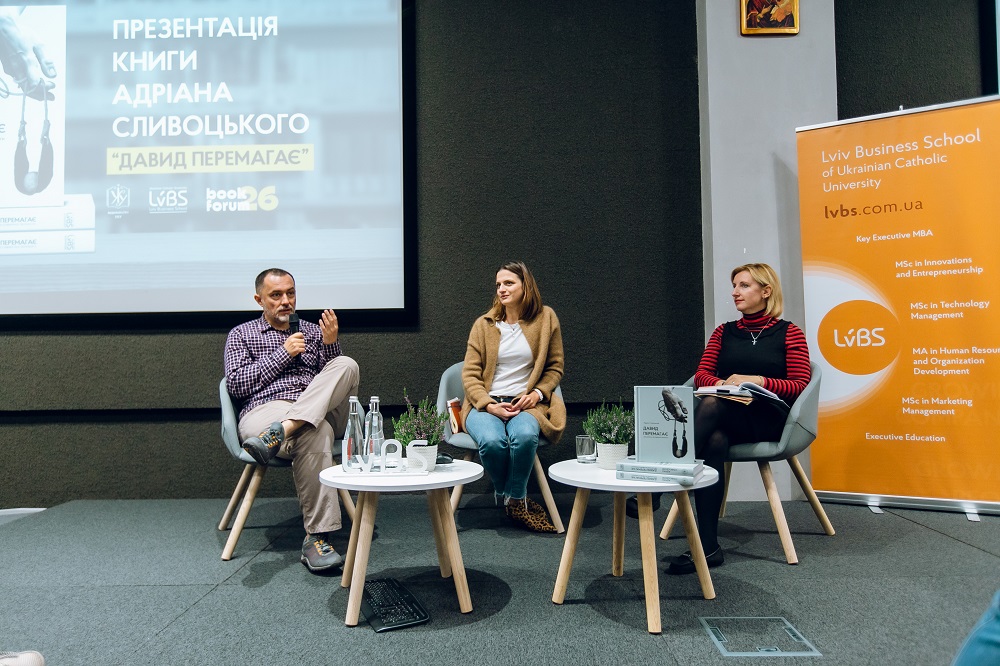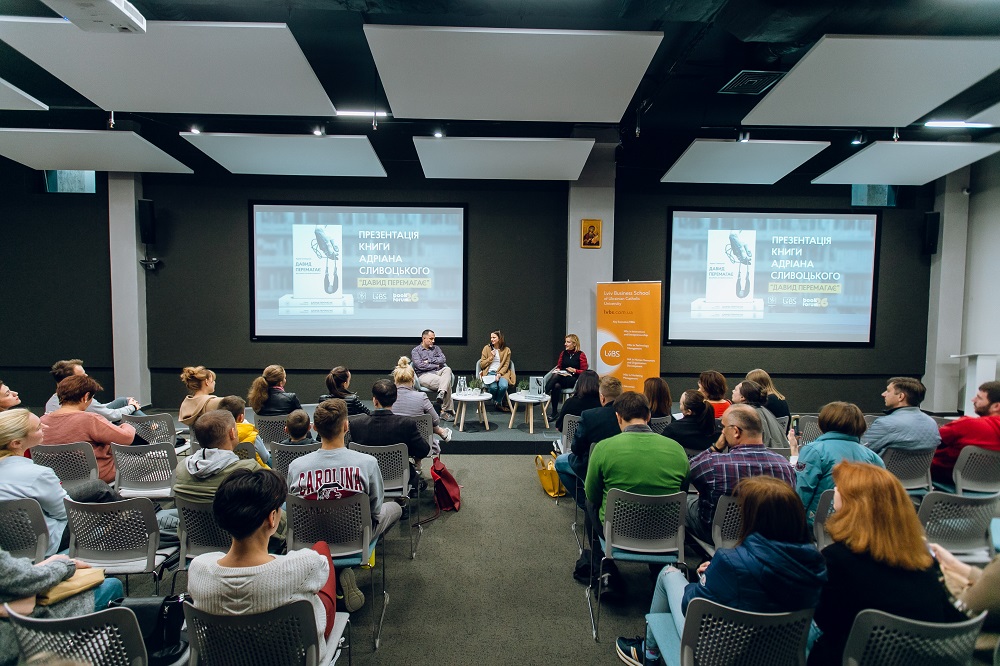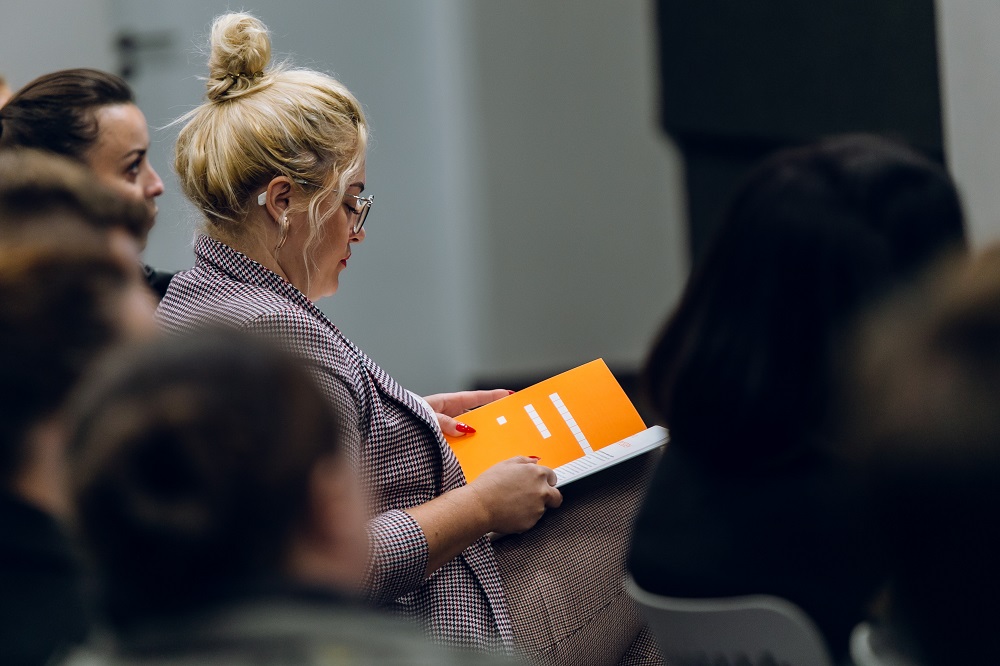“David Wins: The Discipline of a Disproportionate Victory” is a new book by Adrian Slywotzky, one of the most influential experts in modern management, and a business thinker for the world. He analyzes in detail the experience of small companies (the “Davids”) who, upon eterning the market, beat the big Goliaths. Why are the undefeatable companies like Toyota, Walmart, and Samsung losing to small, new competitors in the market? In his new book, Adrian Slywotzky illustrates an asymmetric model with eight levers to help startups defeat the giants. All you have to do is buy a book published by the UCU Lviv Business School and the Ukrainian Catholic University Publishing House to start working step-by-step with your team in building your own effective business model.

There are questions after each section which the author suggests working on with your colleagues and management teams. “This is a great opportunity to look at yourself from the outside,” said Roksoliana Voronovska, CEO of LvBS Consulting, during a presentation of the book. “What is special is that for the first time Adrian Slywotzky’s book has first been published in Ukrainian and then translated into English. Thus, Ukrainian business has a unique chance to be a few steps ahead of the English-speaking world thanks to the implementation of the methodology proposed by the author. It’s worth hurrying up!”
On September 19, Adrian Slywotzky’s book “David Wins” was presented at UCU’s Lviv Business School as part of the Publishers Forum with the participation of Sofia Opatsky, LvBS Founding Dean and UCU Vice-Rector, and Valeria Kozlov, CEO of PLVision. We have selected a few discussion topics that we hope will encourage you to move quickly.

So, why start working today on an asymmetric model?
- You will become a 21st century company
The era of anomalies when small teams can do great things has arrived. Have you rethought your business model? Because it’s not guaranteed that it will be needed in a year or two by your customers. If you want to remain an organization of the 20th century, you need to have a breakthrough. The startup planet is the largest laboratory in the world, set up as a network of business model innovation, disproportionate struggle and accelerated economic evolution. Why not take advantage of it?
- You will make mistakes quickly, correctly and effectively
What happens to the people who make mistakes in your organization? Unfortunately, it’s historically shameful in Ukrainian culture to make an error. However in the US, investors will be more willing to speak to you if your resume already has a few setbacks because it means you tried and learned something.
Another thing is that many people think that if they admit a mistake, then their image will be tarnished. However, failure is a way of acquiring experience and information. When making a mistake, one needs to understand what one risks and what information one wants to gain. Hence, one should try to take the opportunity of experimenting with the culture of the organization, while emphasizing goals and responsibilities. The problem is not when failures occur, but when one fail to draw conclusions from them. Making mistakes becomes more difficult as an organization grows. Therefore, large companies either set up separate innovation and R&D divisions or buy startups, but do not attach them to the core structure, and these teams work outside the company.
The art of making the right mistake should be taught to children from a young age, especially at school. Ask yourself, what opportunities for mistakes do you give your children?

- You will build an effective strategy and business design
Often, young teams and already established, successful businesses are faced with the fact that, having an image in their head, they know what they want to do and where to go, but at the stage of implementation, they cannot reach their planned goals and indicators. In fact, the tool that Adrian Slywotzky offers is a road map showing how to achieve a desired result step-by-step. It invites readers to make their own connections between key elements of the asymmetric model because it is not enough to simply change or improve something. In order for the business model to start developing and gaining momentum, it is important to understand how business works as a system. According to Slywotzky’s model, one can analyze the company at different stages of development. Thus, by working on this book you will help your business build an effective strategy.
You no longer need to invite experts for strategic sessions. By having this book and following the author’s instructions, you will be able to work effectively with your team to develop and implement a strategy. The model is simple and straightforward, but difficult to implement. You can achieve a good result if you buy the book and have lunch with your team twice a month. Discussion also gives an opportunity to people who, while working in the company every day, do not always interact with each other to start talking about the important things.
Additionally, the asymmetric approach Adrian Slywotzky offers is built on the basis of concrete practical things and in collaboration with business. The author has repeatedly met with entrepreneurs in Ukraine, asked them to pre-read excerpts from the book, discussed, and considered their wishes.
You can use this asymmetric model not only in business. “You can act asymmetrically, like a parish priest who, in a ten-minute sermon, if it is authentic, specific, and deeply spiritual, can convey to parishioners more valuable information and spiritual nourishment than all the inexhaustible waves of nonsense they pour on the parish a week,” says Adrian Slywotzky in the book.

Reference: Adrian Slywotzky, Ph.D., a partner at Oliver Wyman, has twice been on the list of the top 50 business thinkers in the world and top 25 business consultants. One of the most prominent specialists in modern management, the American economist is the son of immigrants from the Ivano-Frankivsk region. He studied at Harvard Law School and Harvard Business School.
Adrian Slywotzky’s three books, “The Art of Demand”, “The Profit Zone”, and “The Upside”, have been translated by UCU’s Lviv Business School.




















